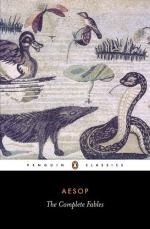PROMETHEUS AND THE MAKING OF MAN
At the bidding of Jupiter, Prometheus set about the creation of Man and the other animals. Jupiter, seeing that Mankind, the only rational creatures, were far outnumbered by the irrational beasts, bade him redress the balance by turning some of the latter into men. Prometheus did as he was bidden, and this is the reason why some people have the forms of men but the souls of beasts.
THE SWALLOW AND THE CROW
A Swallow was once boasting to a Crow about her birth. “I was once a princess,” said she, “the daughter of a King of Athens, but my husband used me cruelly, and cut out my tongue for a slight fault. Then, to protect me from further injury, I was turned by Juno into a bird.” “You chatter quite enough as it is,” said the Crow. “What you would have been like if you hadn’t lost your tongue, I can’t think.”
THE HUNTER AND THE HORSEMAN
A Hunter went out after game, and succeeded in catching a hare, which he was carrying home with him when he met a man on horseback, who said to him, “You have had some sport I see, sir,” and offered to buy it. The Hunter readily agreed; but the Horseman had no sooner got the hare in his hands than he set spurs to his horse and went off at full gallop. The Hunter ran after him for some little distance; but it soon dawned upon him that he had been tricked, and he gave up trying to overtake the Horseman, and, to save his face, called after him as loud as he could, “All right, sir, all right, take your hare: it was meant all along as a present.”
THE GOATHERD AND THE WILD GOATS
A Goatherd was tending his goats out at pasture when he saw a number of Wild Goats approach and mingle with his flock. At the end of the day he drove them home and put them all into the pen together. Next day the weather was so bad that he could not take them out as usual: so he kept them at home in the pen, and fed them there. He only gave his own goats enough food to keep them from starving, but he gave the Wild Goats as much as they could eat and more; for he was very anxious for them to stay, and he thought that if he fed them well they wouldn’t




